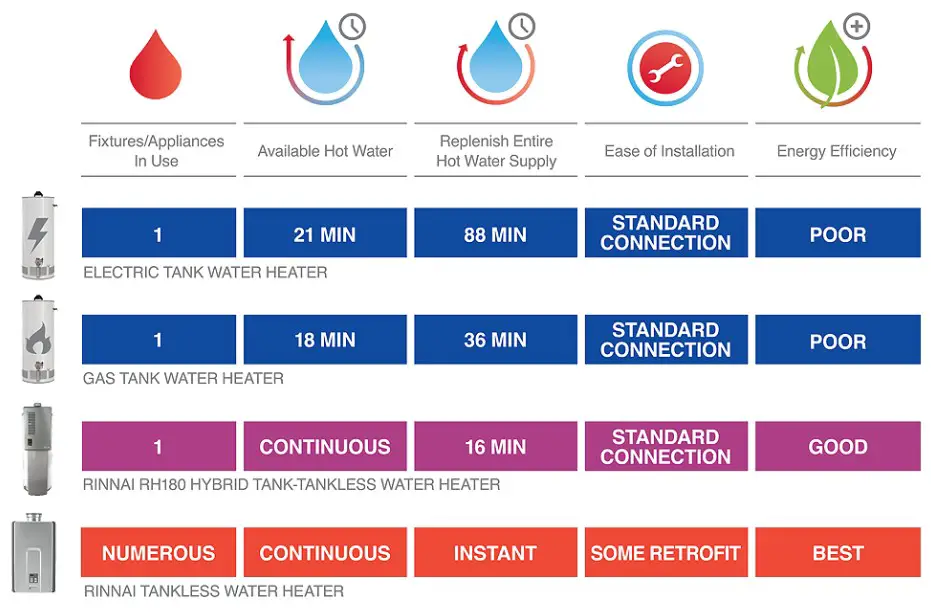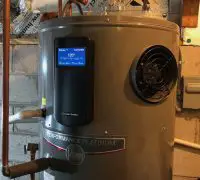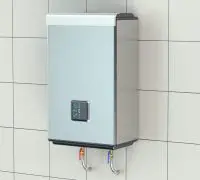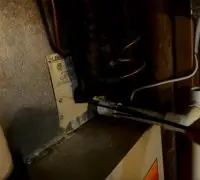If you're looking to fix or replace your Heating or A/C system, we can connect you with a reliable and cost-effective professional in your area.
For those of you who don’t know, tankless water heaters (aka “on-demand”) are units that give hot water only when needed. They don’t cause the standby energy loses that come with traditional tank water heaters, which is a significant benefit.
Not only that, they use energy only when you’re tapping the hot water, but they also save you thousands of gallons of water in a year.
Page Table of Contents
- What’s the best explanation for energy efficiency?
- Can we talk about energy efficiency in the case of tankless water heaters?
- What do the numbers say?
- How to describe the energy efficiency of gas tankless water heaters?
- What about the electric models?
- Is it possible to use the tankless water heater in case of a power outage?
- Why worry about the energy efficiency of your tankless water heater?
What’s the best explanation for energy efficiency?
Conventional tank water heaters present an energy factor of 60 (give or take). Therefore, 60% of the energy that they produce is used, whereas the rest of 40% is lost throughout the process. The heat will exit through the vent.
On the other hand, tankless water heaters have a .80-.99 energy factor. It’s evident that they lower the heat loss by a lot, using less fuel for heating the same amount of water.
Can we talk about energy efficiency in the case of tankless water heaters?
The brief answer would be “yes,” but there are a couple of things to address for understanding energy efficiency.
Energy efficiency is measured as Energy Factor (EF), which informs you about the overall energy efficiency of your tankless unit. The amount of hot water produced by the group and the fuel consumed in a day is what gives the energy factor.
Several factors impact the measurement:
- Recovery time- how efficiently is the heat (produced by the unit) carried to the water
- Standby loss- it only concerns the traditional tank water heaters. It’s the percentage of heat loss from the tank as opposed to the heat of the water
- Cycling loss- it refers to the heat lost when the water circulates through the system
In the case of tankless water heaters, we can’t talk about the recovery or standby loss. Cycling loss is present only in water heaters that don’t include cycling throughout the unit.
What do the numbers say?
In the case of a regular home needing 41gallons or less of hot water in a day, tankless water heaters can become 24-34% more energy efficient than the conventional opponents with tanks. They are 8-14% more energy-efficient for residencies with high hot water demand (somewhere around 86 gallons per day). Installing a tankless water heater at every hot water outlet (single point of use) may even be better, saving you 27-50% energy.
Frankly, the initial investment for a tankless water heater is more substantial than the one for the conventional counterparts with tanks. Still, the tankless units are more durable and have lower energy costs and operating costs. You can expect a tankless unit to last for two decades or so. The parts are easy to replace too. In the case of storage water heaters, the lifespan is 10-15 years.
The issue with the standby heat losses is avoided with the tankless water heaters. But it doesn’t mean there aren’t any losses at all.
How to describe the energy efficiency of gas tankless water heaters?
Gas-fired tankless water heaters are a great choice, especially if you live in an area where there are no problems with the gas pressure. Gas units are typical 23% more effective than the traditional counterparts.
For example, gas-fired tankless water heaters present high flow rates (as opposed to electric models), but they lose energy when they come with a continually burning pilot light. This feature alone can eliminate right from the beginning the standby energy losses when compared to traditional systems with tanks. For the gas-fired tank water heater systems, the pilot light will produce heat in the tank, without losing energy.
The cost of using the pilot light in a gas tankless water heater is different between models. You can simply ask the manufacturer about the gas used by the pilot light. When you select a water heater with standing pilot light, you may turn it off instantly when not using the heater. It’s going to save some energy.
The gas models with an intermittent ignition device and not a standing pilot light are also the right choice. The device reminds of a spark ignition device that ovens or kitchen ranges have.
What about the electric models?
For some, the electric units are the ideal option. You need to consider many aspects when choosing between gas and electric tankless water heaters.
The electric unit needs a lot of amps for heating the water. In some areas, electric models may not work, especially if gas is more affordable and readily available.
At the end of it all, tankless water heaters are more energy-efficient, simply because they don’t need fuel for storing the water (there is no tank!).
Energy Star highlights that a common family may save at least $100 every year when running a tankless water heater that has Energy Star certification.
Is it possible to use the tankless water heater in case of a power outage?
Not all water heaters require electricity (the gas-fired units that come without a pilot light, for instance), which is why they are a reliable option when you’re continually dealing with power outages.
Tankless water heaters can work along with other water heater types that don’t require electricity, with solar water heaters as a reliable choice. Even in the case of regular tankless water heaters, the computer component may be powered by a battery backup. Therefore, the gas or propane-powered tankless water heater can operate for quite some time without electricity supply.
No matter the kind of fuel (electricity, gas, or propane), tankless water heaters require some electricity for running ignition and computer controls. Either way, there are plenty of choices, so look carefully when buying.
Why worry about the energy efficiency of your tankless water heater?
One of the many reasons for which people choose to switch from a traditional water heater with a tank to tankless units is because the latter are environmentally friendly for heating the water. You can maximize the heat produced by the water heater, lowering the heat loss. Even if you get to use the same amount of hot water as when you were using the conventional tank water heater, you will still lower the energy usage.
We can definitely connect you with a trusted provider in your area to repair, replace or maintain your heating and A/C systems. Why not let us find a professional for you?






